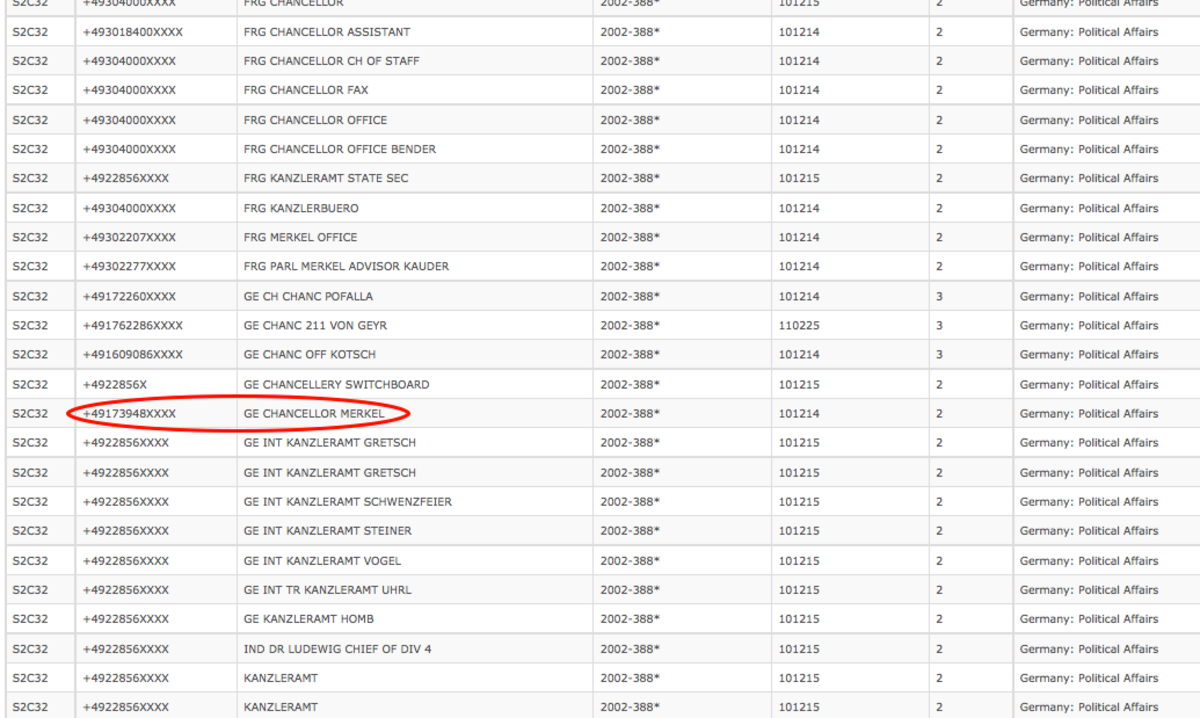Last month, German federal prosecutors announced they had wound down their inconclusive investigation into claims that Chancellor Angela Merkel’s mobile phone had been tapped by the US National Security Agency (NSA).
Prosecutors said the investigation, which was opened in June 2013 following reports by German weekly news magazine Der Spiegel that the NSA had a database containing Merkel’s mobile number, was closed because “no evidence of surveillance of the mobile phone used by the chancellor” had been found to be solid enough to launch a legal case against the agency.
But Mediapart, in collaboration with WikiLeaks, can reveal here the proof that not only Merkel’s mobile phone was under surveillance by the US spy agency, but also four other mobiles and 52 landline numbers within the chancellery, including many allocated to Merkel’s senior and close staff.
Featured in the NSA document below, the chancellor’s mobile, which begins with the digits 00173948 (the remainder have been deliberately masked here) and which was opened with mobile operator Vodaphone, is still active. Mediapart called the number and was rerouted to a voicemail message.
According to German daily Süddeutsche Zeitung, in a report published online Wednesday hours after the Wikileaks site presented the document, the number is that used by Merkel until the end of 2013.

Enlargement : Illustration 1

Above: a section of the NSA data file of phone numbers belonging to German Chancellor Angela Merkel and chancellery staff (last digits deliberately masked). Merkel's mobile phone number is circled in red.
The phone communications within the heart of the German government, including the chancellery’s switchboard and fax machines, were hacked by the NSA over many years and probably, according to Süddeutsche Zeitung, from the early 1990s: the daily found that some numbers are phone lines opened in Bonn, the former federal German capital until 1999, including that of an aide to then-Chancellor Helmut Kohl and who resigned from his post in 1994. Whilst the NSA database was regularly updated, previously listed numbers remained on the records.
The methodical surveillance targeted, among others, eight direct phone numbers, including those of Merkel’s personal assistant and her chief-of-staff, and others installed in her own office, including a fax line.
The chancellery numbers are still active. One dialled by Mediapart was answered by the voice of a woman who chirpily announced “the chancellor’s office”.
Six numbers that feature on the list are indicated by the NSA as “State Sec”. Some of these now connect to phones inside the office of former German minister and now chief-of-staff at the chancellery, Peter Altmaier, a close and long-serving aide to Merkel. Last week he summoned the US ambassador to Germany to a meeting over the recent Wikileaks revelations of NSA taps on German ministries.
The NSA database of phone numbers also includes that of Altmaier’s predecessor (from 2009 to 2013), Ronald Pofalla. His number is earmarked by the NSA as ‘CH CHANC’ – meaning chief of the chancellery. When Mediapart called the listed number on Wednesday, Ronald Pofalla answered in person. Told why we were calling, he declined to discuss the issue, referring us to put in a request with his office.
Two mobile phone numbers belonging to high-ranking German diplomat Géza Andreas von Geyr, a specialist in international political and defence matters, were also under surveillance by the NSA. Vice president between 2010 and 2014 of the federal intelligence service, the BND, he is now a director-general for security and defence policy in the German defence ministry.
The BND is currently embroiled in controversy after a parliamentary committee investigating the NSA surveillance allegations uncovered it was itself involved in active widespread surveillance of foreign telecommunications traffic, and allegedly carried out interceptions of European political leaders’ phone conversations in collaboration with the NSA.
Some 20 numbers on the NSA list revealed here correspond with lines opened in the former chancellery buildings in Bonn before the seat was transferred to Berlin in 1999. They include one used by Bodo Hombach, adminstrative chief of the chancellery from 1988-99 under then-Chancellor Gerhard Schröder, and another belonging to Ernst Uhrlau, who in 1998 was appointed head of the chancellery’s ‘Section 6’ which oversaw the activities of the German secret services.
"Spying on friends is not on at all," declared Angela Merkel after the first evidence of NSA hacking emerged in October 2013 following a German intelligence probe into the reports by Der Spiegel. Yet in the intervening period, mounting revelations of the US surveillance have unveiled massive eavesdropping on communications across the German state apparatus, carried out via phone and satellite interceptions, but also through the US embassy in Berlin’s roof-mounted listening station.
Despite the stern meeting between Merkel’s chief-of-staff Peter Altmaier and US ambassador John Emerson earlier this month, the chancellor herself has not publicly protested the recent Wikileaks evidence of the NSA’s interceptions. Contacted by Süddeutsche Zeitung on Wednesday, a chancellery spokesman quoted by the daily said “an evaluation of the documents is not, for the moment, possible”. But while Berlin appears until now keen to avoid a high-profile conflict with the US over the NSA’s secret surveillance, the revelations presented here may well make that position untenable.
-------------------------
The French version of this article can be found here.
English version by Graham Tearse


